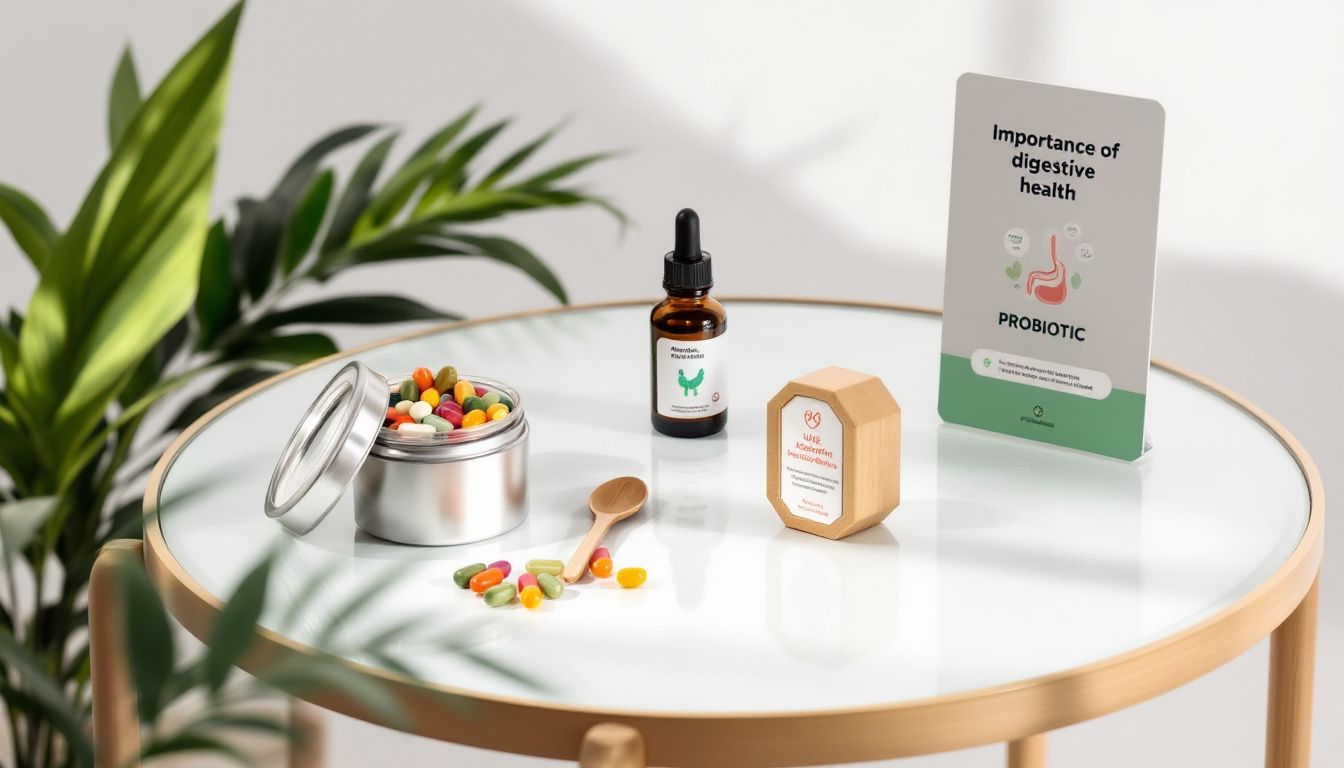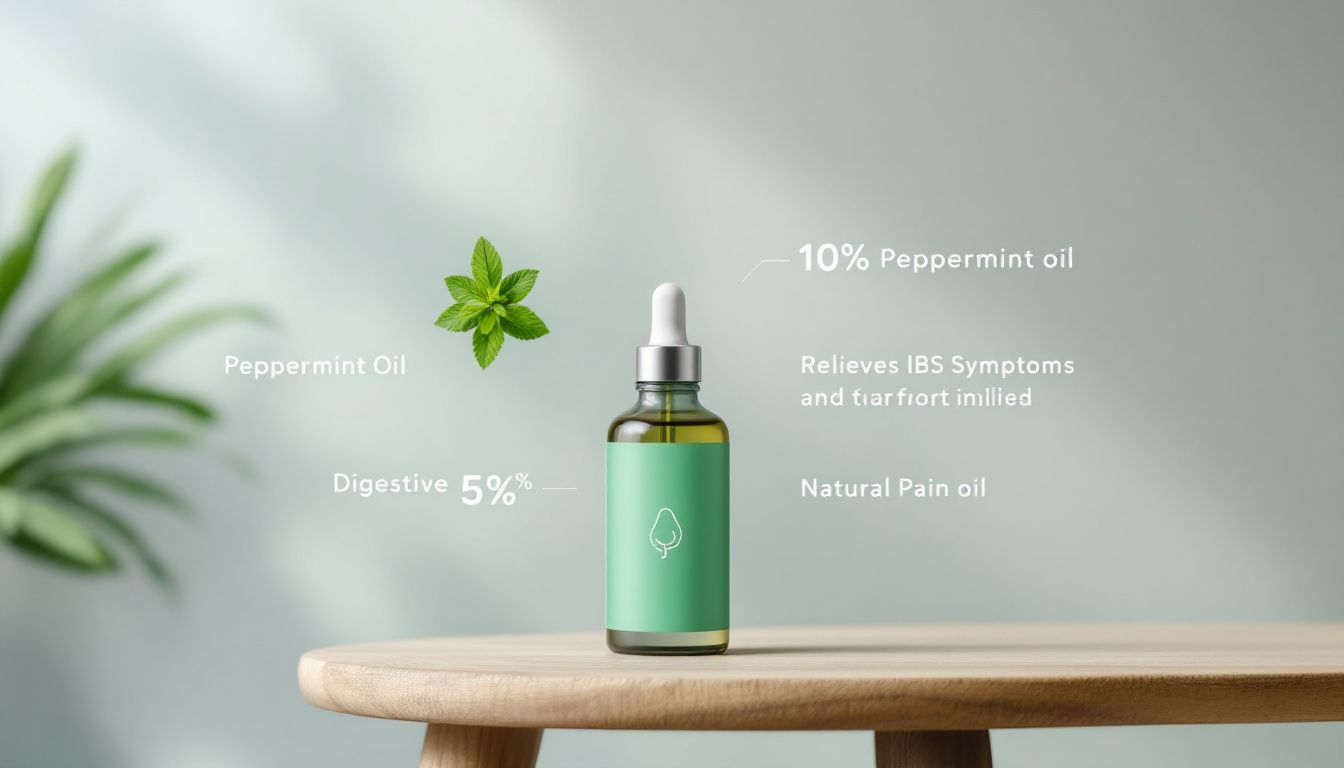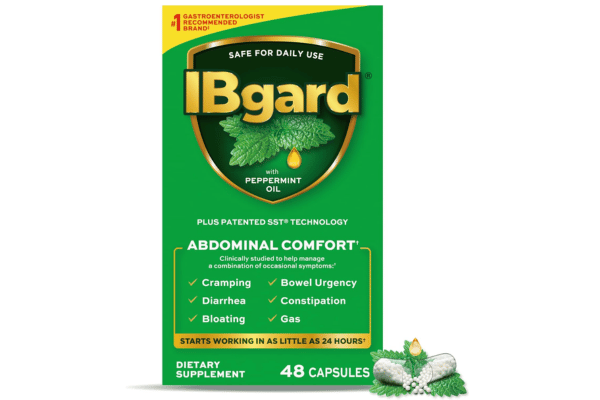Living with irritable bowel syndrome (IBS) can feel like navigating a maze with no clear way out. The unpredictable swings between constipation, diarrhea, and belly pain can disrupt even the most straightforward daily routines, leaving many IBS sufferers searching for effective relief. If you’re one of the millions dealing with altered bowel habits and other persistent gastrointestinal symptoms, the good news is that advancements in dietary supplements offer hope. From probiotics to peppermint oil, natural solutions backed by clinical trials target the root causes of IBS, offering potential relief and improving your quality of life.
This comprehensive review explores the best supplement for IBS to help you make informed choices about managing your symptoms. Research shows that probiotics, especially strains like Lactobacillus and Bifidobacterium, can restore gut bacteria balance, easing symptoms like bloating and irregular stool consistency. For those struggling with constipation or diarrhea-predominant IBS, soluble fiber supplements like psyllium husk can regulate bowel habits while promoting good bacteria in the gut. And if abdominal pain is your biggest challenge, peppermint oil—particularly enteric-coated formulations—provides a natural way to relax intestinal muscles. Whether you’re exploring complementary health approaches or want relief from IBS, this guide will walk you through the most beneficial supplements to regain control of your digestive system and enhance your quality of life.
Key Takeaways
- Probiotics, especially strains of Lactobacillus and Bifidobacterium, effectively relieve IBS symptoms and improve gut health.
- Soluble fiber supplements, particularly psyllium husk, can significantly enhance bowel regularity and alleviate constipation and diarrhea in IBS patients.
- Peppermint oil provides natural relief from abdominal pain by relaxing bowel muscles; although its effects are short-lived, monitoring for side effects is recommended.
Probiotics: Enhancing Gut Health for IBS Patients

Probiotics have emerged as a promising solution for irritable bowel syndrome patients, offering significant relief from various IBS symptoms. Studies have shown that probiotics can reduce the severity of symptoms such as abdominal pain and bloating, improving the overall quality of life for IBS patients. A meta-analysis indicated that probiotics almost double the likelihood of symptom improvement compared to a placebo. This makes them a valuable addition to the complementary and integrative health approaches used to manage irritable bowel syndrome IBS.
Probiotics enhance gut health by promoting a balanced gut microbiome. This balance of good bacteria is vital for digestive health and managing IBS symptoms. However, the effects can vary among individuals, so choosing the right strains and following usage guidelines is essential.
Probiotics can significantly improve gastrointestinal comfort, especially for those with diarrhea-predominant IBS or altered bowel habits. Understanding the right probiotic strains and best practices for dosage and duration can enhance their benefits.
Choosing the Right Probiotic Strain
Choosing the right probiotic strain is key to managing IBS symptoms effectively. Lactobacillus and Bifidobacterium are among the most effective strains for improving gut health and alleviating IBS symptoms. Often, these strains are combined in supplements to enhance therapeutic effects.
Lactobacillus helps maintain a healthy gut microbiome by promoting the growth of good bacteria, while Bifidobacterium aids in reducing gastrointestinal symptoms such as bloating and discomfort. By choosing supplements that contain these strains, IBS patients can experience significant improvements in their digestive health and overall quality of life.
Recommended Dosage and Duration
When adding probiotics to your diet, start gradually to minimize potential gastrointestinal discomfort. While specific dosage recommendations for IBS treatment are lacking, following healthcare professionals’ guidelines can help achieve optimal results.
Gradually increasing probiotic intake helps your digestive system adjust, potentially significantly improving IBS symptoms. Consistency and adherence to recommended dosage and duration guidelines are crucial for experiencing the full benefits.
Soluble Fiber Supplements: Easing IBS Symptoms

Soluble fiber supplements effectively manage IBS symptoms, especially for those with constipation. Soluble fiber improves stool viscosity, improving stool consistency and easing gastrointestinal symptoms. Adding soluble fiber can significantly improve bowel habits and overall digestive health.
Psyllium husk is a highly recommended soluble fiber for IBS sufferers, offering substantial benefits for managing bowel movements and alleviating constipation and diarrhea. It can be helpful to understand its benefits and practical tips for incorporating it into your diet.
Psyllium Husk: A Popular Choice
Psyllium husk is a well-known soluble fiber that enhances bowel regularity and improves the quality of life for IBS sufferers. It is particularly effective in managing constipation and diarrhea, making it a versatile option for those with irritable bowel syndrome.
Incorporating psyllium husk into the diet can significantly improve bowel habits, enhance overall digestive health, and relieve IBS symptoms, making it a valuable dietary supplement for managing IBS. For those interested in exploring the best options, check out our article, “Unlock Digestive Wellness: The Ultimate Guide to the Best Psyllium Fiber Supplement.” This comprehensive guide introduces five top-rated Psyllium Fiber supplements found on Amazon. It offers an invaluable resource to help IBS sufferers and others interested in boosting their fiber intake to improve stool consistency, gut microbiome health, and overall quality of life.
How to Incorporate Soluble Fiber into Your Diet
To incorporate soluble fiber effectively, gradually increase your fiber intake over time. This helps avoid digestive discomfort and allows your body to adjust. Drinking plenty of water is also essential, as it aids in the smooth passage of stool.
Gradually increasing fiber intake, staying hydrated, and keeping doses low helps IBS patients integrate soluble fiber into their diet without worsening symptoms, maximizing benefits while minimizing potential discomfort.
Peppermint Oil: Natural Relief for IBS Pain

Peppermint oil is a natural remedy that significantly relieves IBS pain, particularly abdominal discomfort. Enteric-coated formulations are particularly effective in enhancing gastrointestinal comfort for IBS patients.
This section will explore the mechanism of action of peppermint oil and provide insights into its optimal usage and safety.
Mechanism of Action
Peppermint oil relaxes bowel muscles, alleviating IBS symptoms. L-menthol, its active component, acts on calcium channels in smooth muscle to induce relaxation, relieving abdominal discomfort, making it an effective natural treatment for IBS.
Clinical trials show peppermint oil’s beneficial effects in reducing visceral hypersensitivity and improving gastrointestinal comfort for IBS patients, making it a valuable addition to alternative therapies for managing irritable bowel syndrome.
Optimal Usage and Safety
Peppermint oil is generally safe for most, but its effects are short-lived, and individual responses can vary. Current data is based on small studies with specific formulations, so monitoring reactions and consulting healthcare professionals for optimal usage is essential. Patients should not use peppermint oil for longer than two weeks without medical consultation to monitor potential side effects like heartburn or dry mouth and maintain overall quality of life.
To help readers explore high-quality options, we list two examples of excellent, highly ranked peppermint oil supplements listed on Amazon. These supplements are carefully selected to provide effective and reliable support for managing digestive discomfort.
IBgard - Gut Health Supplement with Peppermint Oil
IBgard is a highly regarded gut health supplement that harnesses the power of ultrapure peppermint oil to help manage various digestive symptoms, including cramping, bowel urgency, diarrhea, constipation, bloating, and gas. Backed by clinical evidence, this gastroenterologist-recommended product uses patented Site-Specific Targeting (SST) technology to deliver its benefits precisely where they are needed in the gut. Peppermint oil in IBgard supports a balanced gut microbiome, relaxes the digestive system, and promotes healthy digestion and nutrient absorption. Designed for fast relief, IBgard provides abdominal comfort in as little as 24 hours when taken daily, making it an excellent option for those seeking practical and targeted digestive support.
NOW Foods Supplements - Peppermint Gels
NOW Foods Peppermint Gels are a trusted intestinal comfort formula designed to support healthy digestion and alleviate occasional minor bowel discomfort. Enhanced with ginger and fennel oils, these gels provide additional gastrointestinal support, promoting normal digestive function. The enteric coating ensures the peppermint oil bypasses the stomach and is released directly into the intestines, where it is most effective. Manufactured under GMP Quality Assured standards, NOW Foods guarantees stability, potency, and high-quality product formulation. Packaged in the USA by a family-owned company with decades of experience, these peppermint gels are an excellent option for those seeking natural and reliable digestive support.
Digestive Enzymes: Supporting Nutrient Digestion

Digestive enzymes support nutrient digestion and alleviate gastrointestinal issues for IBS patients. They help break down food into nutrients, making it easier for the body to absorb them and reducing symptoms like gas and bloating.
This section will discuss the types of digestive enzymes and when to use them for optimal digestive health.
Types of Digestive Enzymes
Digestive enzymes are categorized by the nutrients they break down: lipase for fats, protease for proteins, and lactase for lactose. Understanding these categories helps IBS patients select the right supplements for better digestive health.
Incorporating the right digestive enzymes into the ibs diet helps IBS patients enhance food breakdown and alleviate symptoms like bloating and gas, leading to better nutrient absorption and overall digestive health.
When to Use Digestive Enzymes
Use digestive enzymes when specific food triggers cause gastrointestinal symptoms. For instance, lactase benefits those with lactose intolerance, and alpha-galactosidase aids in digesting galacto-oligosaccharides found in beans and certain vegetables, significantly reducing symptoms and improving digestive comfort.
Identifying specific food sensitivities and selecting the appropriate digestive enzymes helps manage symptoms effectively, allowing IBS patients to enjoy a wider variety of foods without discomfort.
Prebiotics: Feeding Good Bacteria

Prebiotics feed good bacteria in the gut, which is essential for maintaining a healthy gut microbiome. These non-digestible fibers serve as food for beneficial bacteria, improving overall digestive health and managing IBS symptoms.
Common Prebiotics and Their Sources
Inulin and galacto-oligosaccharides are well-known prebiotics that are beneficial for gut health. Inulin is found in foods like onions, garlic, and asparagus, while galacto-oligosaccharides come from beans and certain root vegetables.
Incorporating these prebiotics into the diet promotes the growth of good bacteria, maintaining a healthy gut microbiome. This leads to improved digestive health and better management of IBS symptoms.
Potential Drawbacks
While beneficial for gut health, prebiotics may not suit all IBS patients. Some prebiotic fibers can exacerbate symptoms due to their high fermentable carbohydrate or FODMAP content. IBS patients should consider their tolerances and consult healthcare providers before using prebiotics.
This tailored approach maximizes the benefits of prebiotics while minimizing potential negative impacts on IBS symptoms.
Summary of Supplement Effectiveness
Research indicates that various dietary supplements effectively manage IBS symptoms. Probiotics, especially in higher dosages and specific strains, relieve bloating and flatulence significantly. Digestive enzymes like amylase, lipase, and protease aid nutrient digestion and alleviate gastrointestinal issues.
Peppermint oil offers quick relief from IBS pain, though its effects are typically short-lived. Soluble fiber, particularly psyllium husk, improves stool consistency and eases constipation, making it valuable for IBS patients and can help relieve IBS symptoms.
Despite mixed evidence, prebiotics can enhance beneficial gut bacteria and aid in appropriately managing IBS. Incorporating these supplements into a comprehensive IBS management plan can significantly improve symptoms and quality of life.
Summarizing Our Discussion
Managing irritable bowel syndrome (IBS) requires a compassionate and comprehensive approach that addresses the unique needs of irritable bowel syndrome patients. As IBS continues to impact millions of adults worldwide, the search for practical solutions often leads to natural dietary supplements, vitamins, and minerals as part of a holistic strategy. Probiotics, like Lactobacillus and Bifidobacterium, promote a balanced gut microbiome and help alleviate gastrointestinal symptoms. At the same time, soluble fiber, such as psyllium husk, improves stool consistency and relieves both constipation and diarrhea. Peppermint oil, especially in enteric-coated formulations, offers targeted relief from abdominal pain by relaxing intestinal muscles and supporting healthy digestion.
The journey to relieve IBS symptoms is deeply personal, with many finding success through complementary and integrative health approaches that combine dietary changes, alternative therapies, and specific supplements. Understanding the connection between the digestive system, diet changes, and overall quality of life is essential for IBS sufferers. Resources like clinical trials and systematic reviews highlight the beneficial effects of dietary supplements, helping patients make informed decisions about managing IBS.
By incorporating the best supplement for IBS into your routine—probiotics, soluble fiber, peppermint oil, or other complementary health approaches—you can take meaningful steps toward managing symptoms and improving your quality of life. Every individual’s experience with IBS is unique, and consulting healthcare professionals for tailored advice remains critical. Together with a focus on integrative health and a commitment to your well-being, these strategies can help restore balance and comfort to your daily life.
Brief Answers to FAQs
What are the best probiotic strains for IBS?
The most effective probiotic strains for IBS are Lactobacillus and Bifidobacterium, as they have demonstrated efficacy in promoting gut health and reducing symptoms associated with IBS. Consider incorporating these strains into your regimen for potential relief.
How should I start taking soluble fiber supplements?
To begin taking soluble fiber supplements, start with small doses and gradually increase them while ensuring you drink plenty of water to prevent digestive discomfort. This approach will help your body adjust effectively.
Can peppermint oil help with IBS pain?
Peppermint oil can alleviate IBS pain by relaxing bowel muscles, primarily due to its active component, L-menthol, which interacts with calcium channels in smooth muscle. This makes it a helpful option for managing symptoms.
When should I use digestive enzymes?
You should use digestive enzymes when experiencing symptoms related to specific food triggers, such as lactose intolerance or difficulty digesting certain carbohydrates. This can help alleviate discomfort and improve your digestive health.
Are there any drawbacks to using prebiotics for IBS?
Yes, certain prebiotic fibers may exacerbate IBS symptoms due to their high fermentable carbohydrates or FODMAPs (fermentable oligo-, di-, mono-saccharides, and polyols) content, so it is crucial to assess individual tolerances and consult a healthcare provider before use.
Thanks for taking this journey to explore the best supplement for Irritable Bowl Syndrom. If you want to add to your library of knowledge and are interested in diving deeper into some of the supplements mentioned in this article, you should check out the links above. It could be a huge time-saver - you won't be sorry you took a look.
Also, please return soon to check out our next review of other incredible supplements – we’re always looking out for YOU!
*We are NOT qualified medical advisors. The content here is only based on our personal opinions and research and should NOT be used as a substitute for a healthcare professional's advice!
**This site contains affiliate links. We may earn a small commission through links in this post.













Member discussion